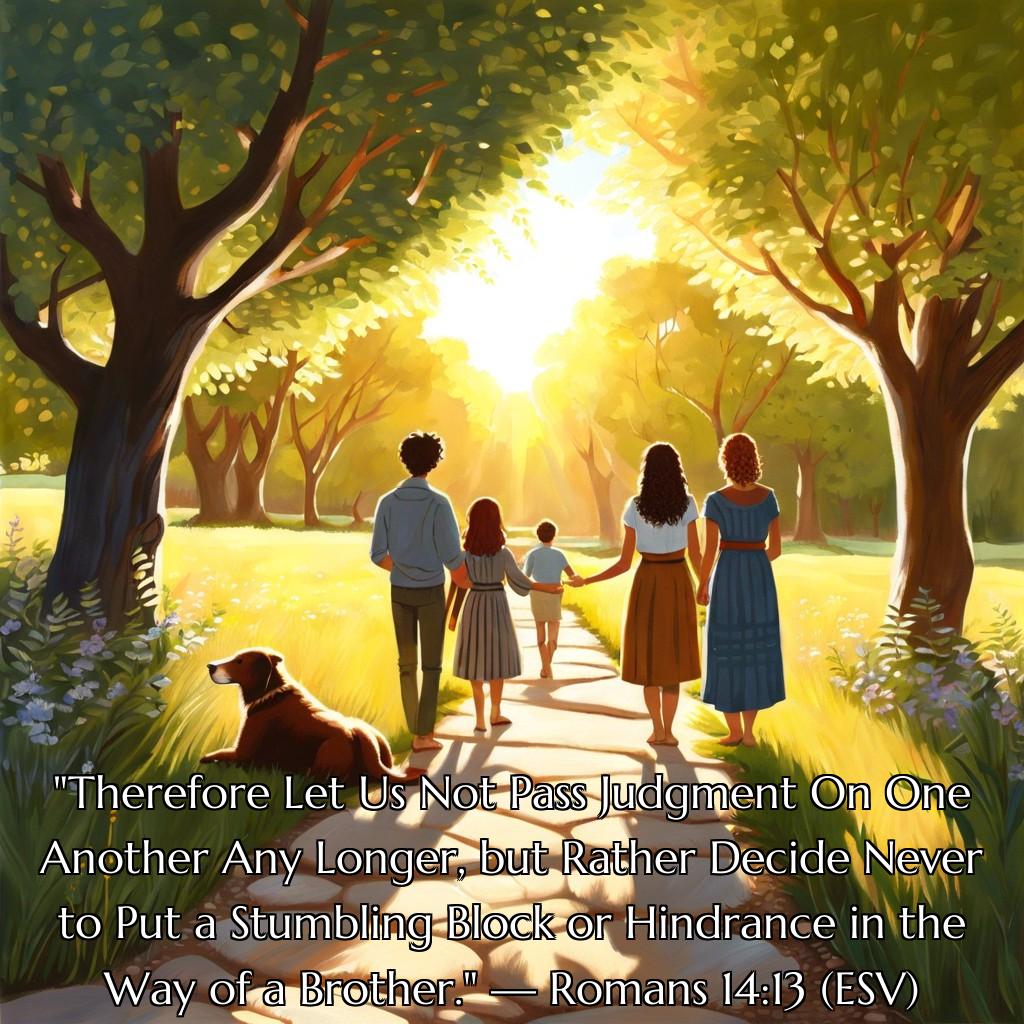This article provides insights into what the Bible says about homosexuality by examining 10 distinct verses, offering context and interpretations for each.
Navigating the Bible’s stance on homosexuality can be challenging, but it is essential for understanding the scripture’s perspective. This article explores key Bible verses on the topic, analyzing their meanings and implications. Whether seeking clarity or deepening your faith, these interpretations offer a thorough examination of what the Bible says about homosexuality. Dive in for comprehensive insights.
Leviticus 18:22 – “Do Not Have Sexual Relations With a Man As One Does With a Woman; That Is Detestable.”
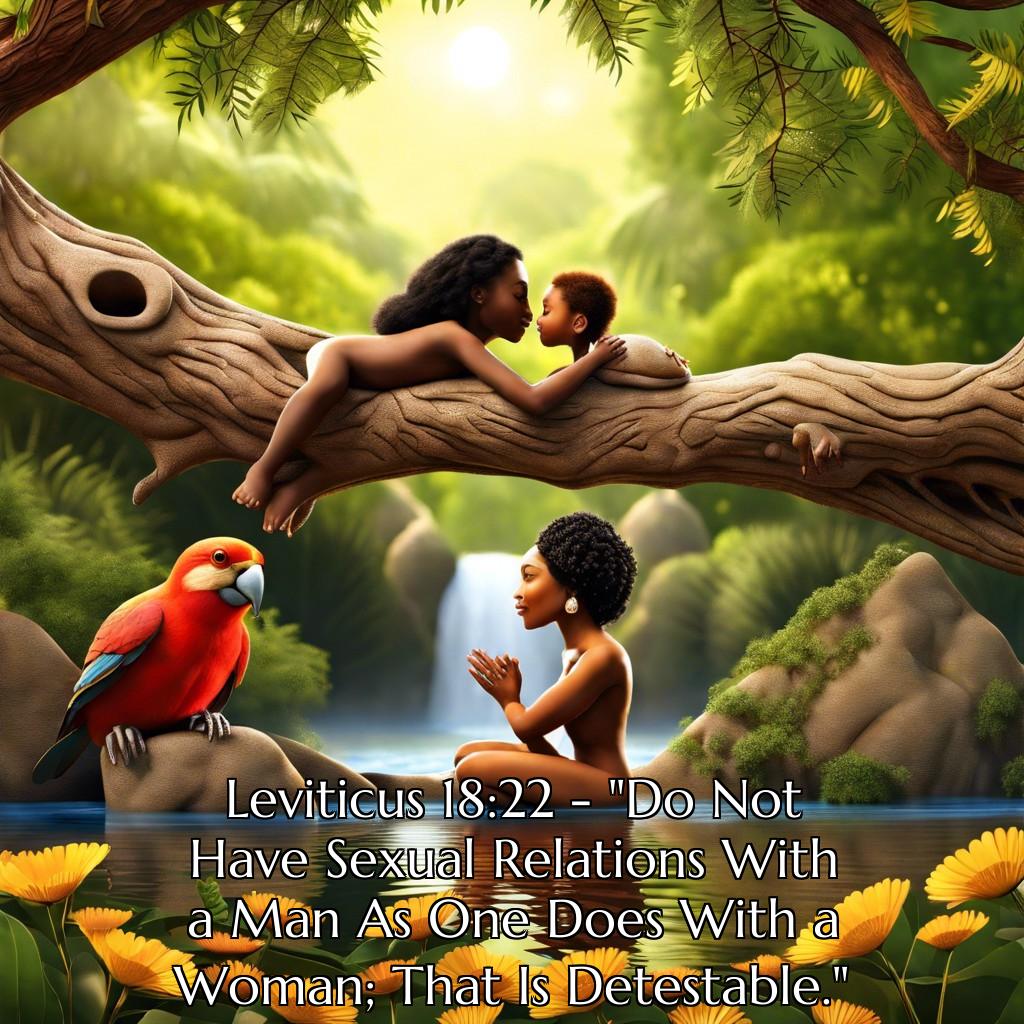
This verse from Leviticus is part of a section often referred to as the Holiness Code, which outlines various behaviors considered unacceptable for the Israelites. It specifies that sexual relations between men are detestable.
- Cultural Context: The Israelites were instructed to uphold distinct moral behaviors to set themselves apart from surrounding nations, which practiced various forms of sexual immorality.
- Holiness Standard: This command underscores the emphasis on holiness and purity that permeates Leviticus. It reflects the larger theme of living in a way that honors God’s distinct design.
- Purpose of the Law: By outlining specific behaviors, such laws were intended to guide the community in moral and religious conduct, fostering a disciplined and holy lifestyle.
Understanding these points helps clarify the intention behind this instruction and its place within the broader biblical narrative about communal and personal sanctity.
Leviticus 20:13 – “If a Man Has Sexual Relations With a Man As One Does With a Woman, Both of Them Have Done What Is Detestable. They Are to Be Put to Death; Their Blood Will Be On Their Own Heads.”

This verse is often cited in discussions about biblical perspectives on homosexuality. Here are some key points to consider:
- Context of Ancient Israel: Leviticus is set within the ancient Israelite context, where laws were given to maintain social and religious purity.
- Holiness Code: This verse is part of the Holiness Code, which includes instructions for living a life set apart for God.
- Severity of the Punishment: The prescribed punishment reflects the severity with which the community was to view this act.
- Old Testament Law: It’s important to understand that Christians today interpret these laws in varying ways, often distinguishing between ceremonial, civil, and moral laws.
- Interpretation Challenges: Modern readers grapple with how these ancient laws apply today, considering the cultural and historical differences.
Understanding these different aspects helps provide a broader perspective on what this verse entails within the biblical narrative.
Romans 1:26-27 – “Because of This, God Gave Them Over to Shameful Lusts. Even Their Women Exchanged Natural Sexual Relations for Unnatural Ones. In the Same Way the Men Also Abandoned Natural Relations With Women and Were Inflamed With Lust for One Another. Men Committed Shameful Acts With Other Men, and Received in Themselves the Due Penalty for Their Error.”

Here, Paul’s letter to the Romans addresses behaviors he describes as contrary to God’s design. He characterizes these actions as “shameful lusts” and cites both men and women engaging in same-sex relations.
It’s important to understand the context in which this was written. Paul was speaking to a Roman culture known for various sexual practices. He contrasts these with what he sees as God’s intended natural relations.
Paul suggests that a departure from God’s natural order results in moral and spiritual consequences. He implies that these actions reflect broader issues of idolatry and rebellion against God.
This passage is often cited in discussions about sexuality, emphasizing a traditional interpretation of sexual ethics in Christianity.
Understanding these verses involves grasping both the immediate cultural context and the broader theological points Paul is making about sin and separation from God.
1 Corinthians 6:9-10 – “Or Do You Not Know That Wrongdoers Will Not Inherit the Kingdom of God? Do Not Be Deceived: Neither the Sexually Immoral nor Idolaters nor Adulterers nor Men Who Have Sex With Men nor Thieves nor the Greedy nor Drunkards nor Slanderers nor Swindlers Will Inherit the Kingdom of God.”

This passage from Corinthians lists several categories of people who will not inherit the kingdom of God, explicitly including those who practice homosexuality. The broader message here stresses moral conduct and the consequences of living outside God’s design.
Firstly, it’s important to understand that Paul is emphasizing the seriousness of sin and its impact on one’s spiritual inheritance. Sexual immorality, including homosexual acts, is grouped with other serious offenses like idolatry and theft.
Secondly, the term “sexually immoral” captures a wide range of actions, and it is not just limited to same-sex relationships. Idolatry, adultery, and greed are also listed, broadening the scope of this moral guideline.
Lastly, this verse isn’t merely condemning behaviors but also serves as a call to reflection and repentance. Paul’s message is about transforming lives to align more closely with God’s will, encouraging self-examination and change.
1 Timothy 1:9-10 – “We Also Know That the Law Is Made Not for the Righteous but for Lawbreakers and Rebels, the Ungodly and Sinful, the Unholy and Irreligious, for Those Who Kill Their Fathers or Mothers, for Murderers, for the Sexually Immoral, for Those Practicing Homosexuality, for Slave Traders and Liars and Perjurers—and for Whatever Else Is Contrary to the Sound Doctrine.”

In this passage, Paul highlights that the law is designed to address sinful behaviors, not for those already living righteously. He lists a series of actions deemed sinful, including practicing homosexuality. Here’s what to note:
- The focus is on moral conduct that violates divine law.
- Homosexuality is grouped with other serious offenses like murder and perjury, indicating its severity in this context.
- Paul emphasizes that such behaviors go against “sound doctrine,” underscoring the importance of aligning one’s life with biblical teachings.
Understanding this verse helps to see the broader biblical perspective on law, morality, and the nature of sin. It’s meant to guide believers towards a life that honors spiritual principles.
Genesis 19:5 – “They Called to Lot, ‘Where Are the Men Who Came to You Tonight? Bring Them Out to Us So That We Can Have Sex With Them.'”
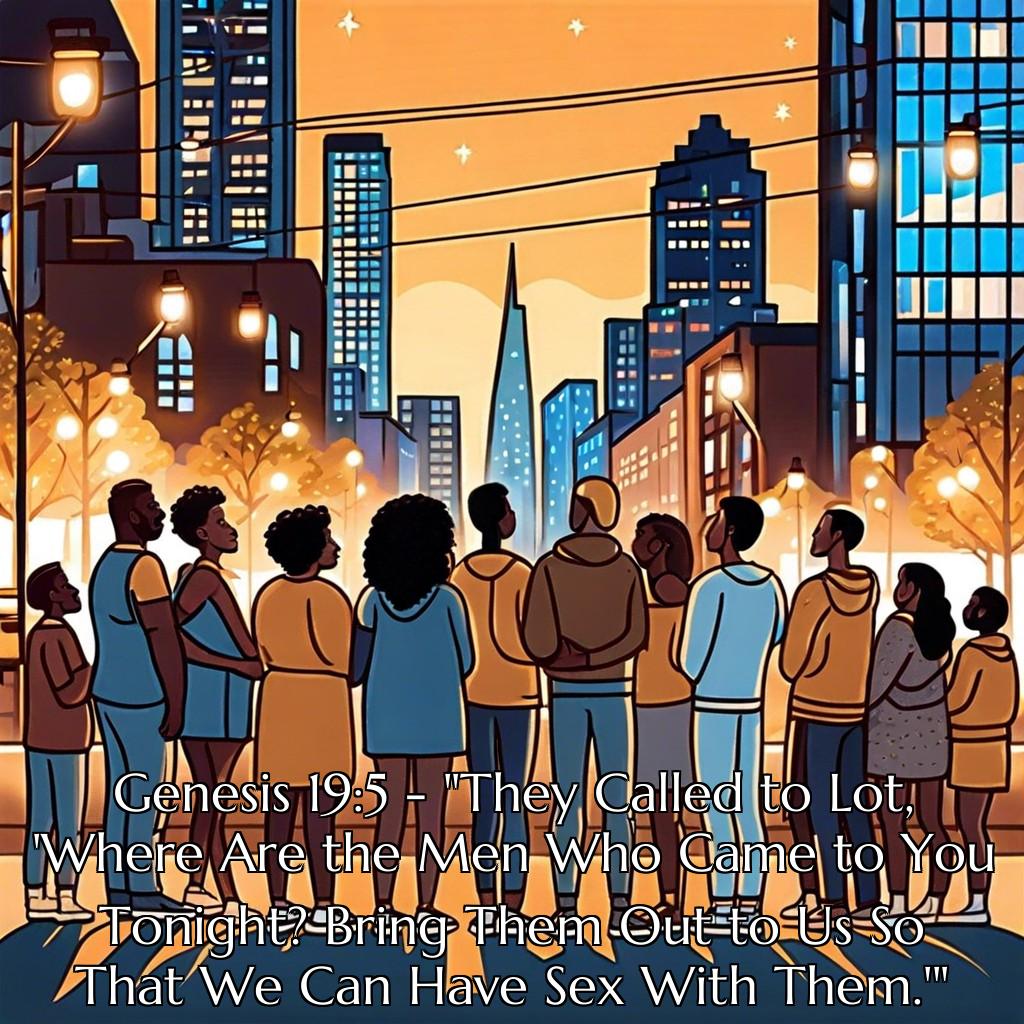
This verse is part of the story of Sodom and Gomorrah, where the inhabitants of Sodom demand that Lot hand over his guests for sexual purposes. The passage often serves as a reference point for discussions around homosexuality in Biblical texts.
First, it’s critical to note that the story emphasizes the extreme wickedness and violence of Sodom’s inhabitants. Their demand shows a severe breach of hospitality and social morals of that time.
Second, the context here is essential. This passage doesn’t solely focus on consensual same-sex relationships, but rather it highlights aggressive and abusive behavior.
Lastly, this incident is frequently interpreted as illustrating the larger moral failures of the city, not just sexual immorality. The worldview is one where acts of violence and neglect of duty towards guests illustrate a deeper spiritual and communal decay.
Jude 1:7 – “In a Similar Way, Sodom and Gomorrah and the Surrounding Towns Gave Themselves Up to Sexual Immorality and Perversion. They Serve As an Example of Those Who Suffer the Punishment of Eternal Fire.”
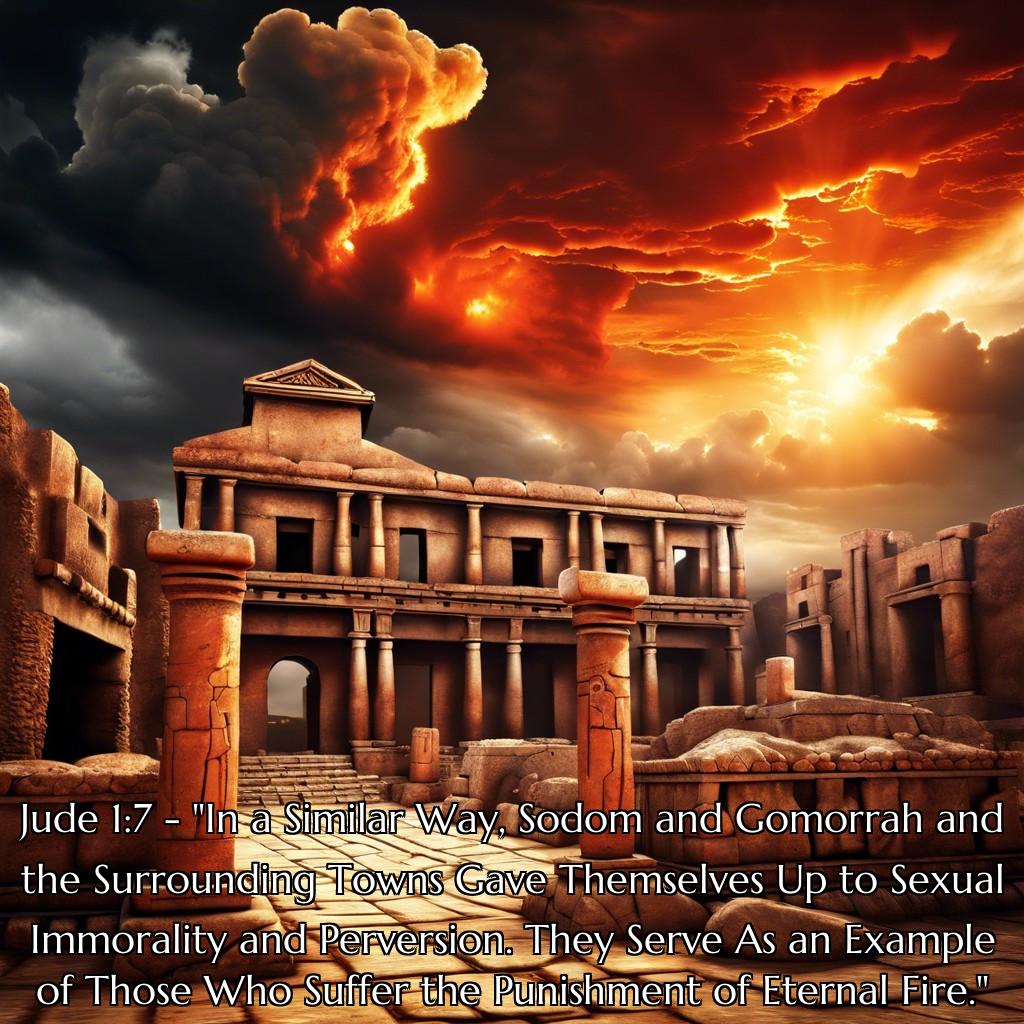
Jude 1:7 highlights the severe consequences faced by the cities of Sodom and Gomorrah due to their engagement in sexual immorality and perversion. These cities are often referenced to illustrate the biblical stance on such behaviors.
Sodom and Gomorrah’s actions served as a historical example of divine judgment. Their downfall underscores the moral boundaries set by scripture.
The mention of eternal fire emphasizes the gravity of their sins and the corresponding eternal consequence. This serves as a warning to stay aligned with biblical teachings.
Overall, Jude 1:7 reinforces the importance of adhering to God’s will and the serious repercussions of deviating from it.
Matthew 19:4-6 – “Haven’t You Read,” He Replied, “that At the Beginning the Creator ‘made Them Male and Female,’ and Said, ‘For This Reason a Man Will Leave His Father and Mother and Be United to His Wife, and the Two Will Become One Flesh’? So They Are No Longer Two, but One Flesh. Therefore What God Has Joined Together, Let No One Separate.”
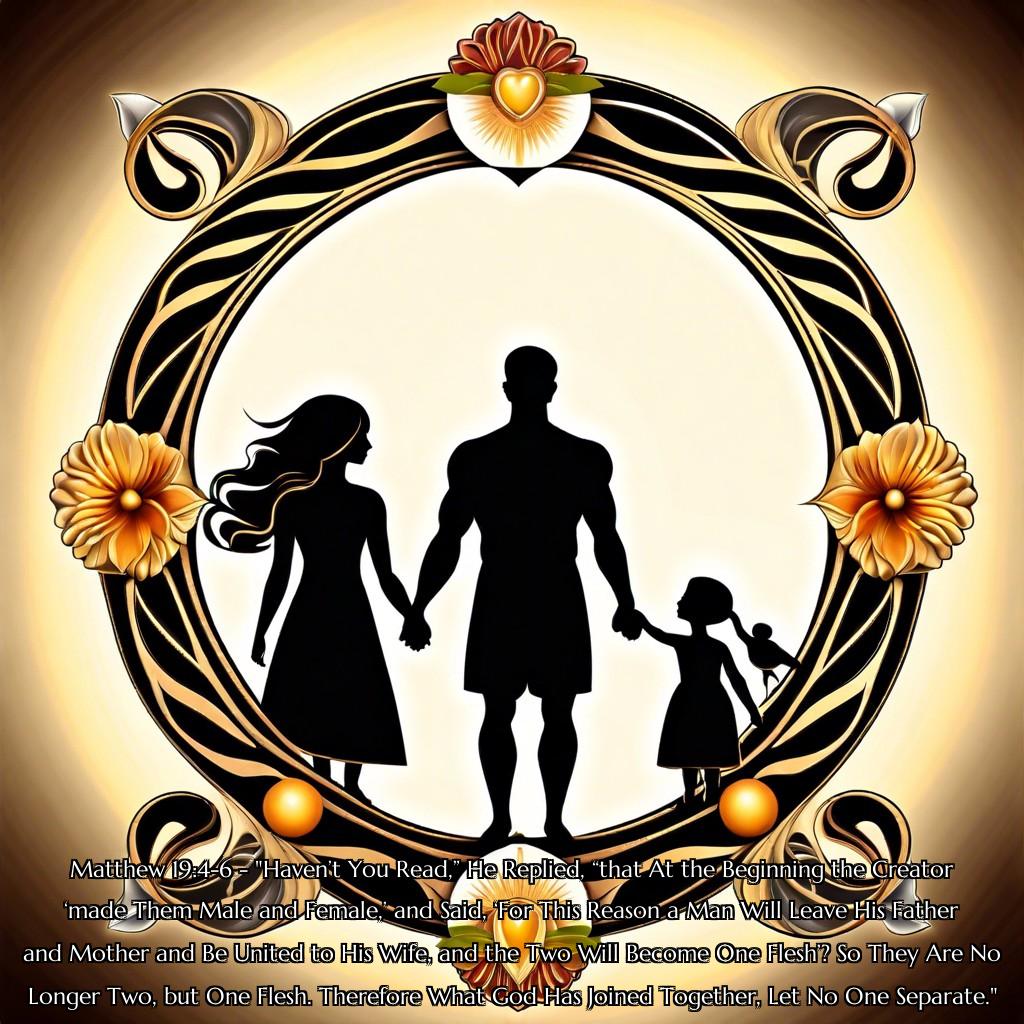
This passage emphasizes the union between a man and a woman as ordained by God from the very beginning of creation. Jesus points out that marriage is a divine institution intended to unite male and female into one entity. Here are a few key concepts:
The Creator’s Design: God intentionally created humans as male and female, highlighting the complementary nature of the sexes.
Unity in Marriage: The verse underscores the idea of two individuals becoming one flesh, symbolizing a deeply intimate and spiritual bond.
Divine Authority: The union is portrayed as something God has joined together, implying that marriage is part of His sovereign will and should not be separated by human efforts.
Jesus’ Teaching on Marriage: By referencing this divine design, Jesus affirms traditional views on marriage while addressing contemporary questions about relationships and familial structures.
This underscores an alignment with the broader biblical narrative on marriage and human relationships.
Mark 10:6-9 – “But At the Beginning of Creation God ‘made Them Male and Female.’ ‘For This Reason a Man Will Leave His Father and Mother and Be United to His Wife, and the Two Will Become One Flesh.’ So They Are No Longer Two, but One Flesh. Therefore What God Has Joined Together, Let No One Separate.”
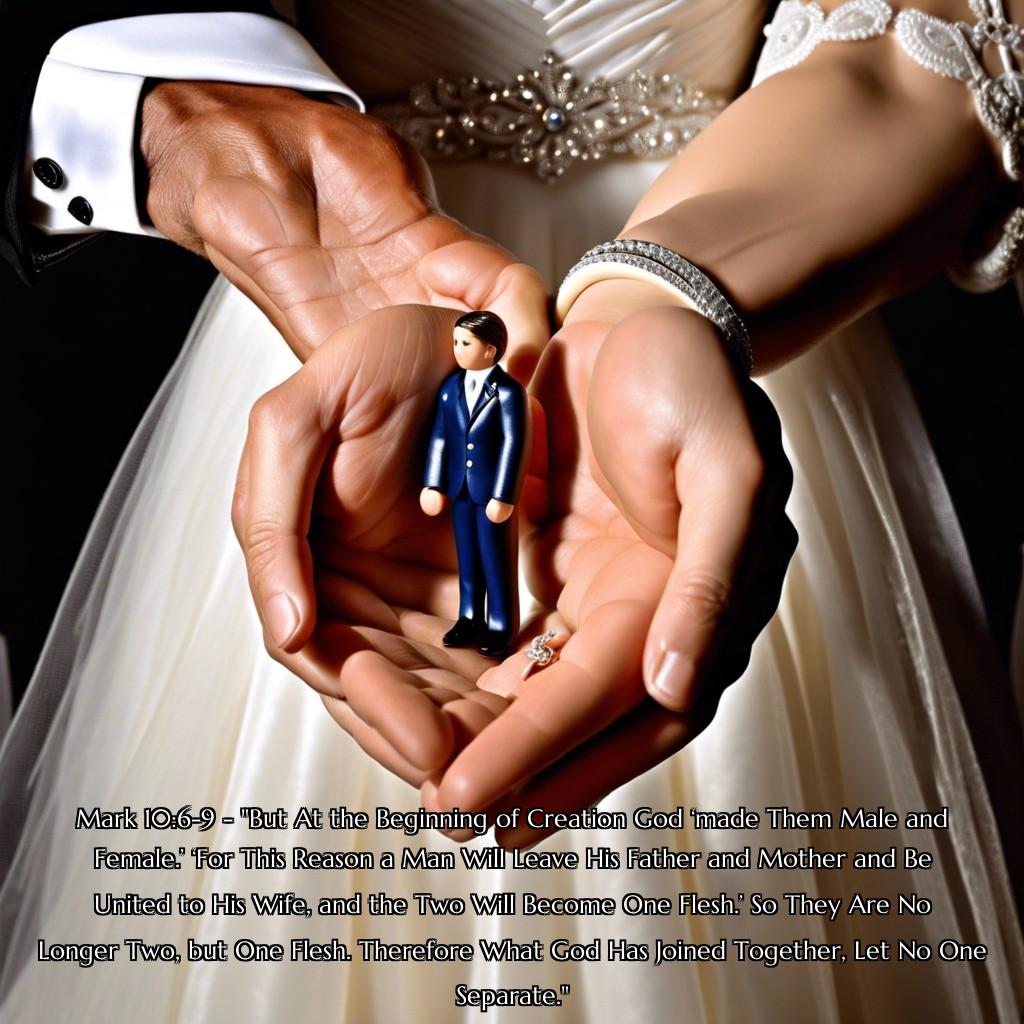
This verse highlights the creation order and the divine intent for marriage. It emphasizes the union of male and female as a foundational concept in the created order.
First, it points out that God made humans as male and female, intended to complement each other. This duality is intrinsic to human nature.
Next, it underscores the institution of marriage—a man leaves his parents and unites with his wife, forming a bond that is so profound they become ‘one flesh.’ This speaks to the deep intimacy and spiritual unity marriage is meant to embody.
Finally, the passage stresses the permanence of this union. What God has joined, humans should not separate. This implies that the marital bond is sacred and meant to endure.
Understanding these elements helps in grasping the broader Biblical view on relationships and marriage.
2 Peter 2:6-7 – “If He Condemned the Cities of Sodom and Gomorrah By Burning Them to Ashes, and Made Them an Example of What Is Going to Happen to the Ungodly; and If He Rescued Lot, a Righteous Man, Who Was Distressed By the Depraved Conduct of the Lawless.”
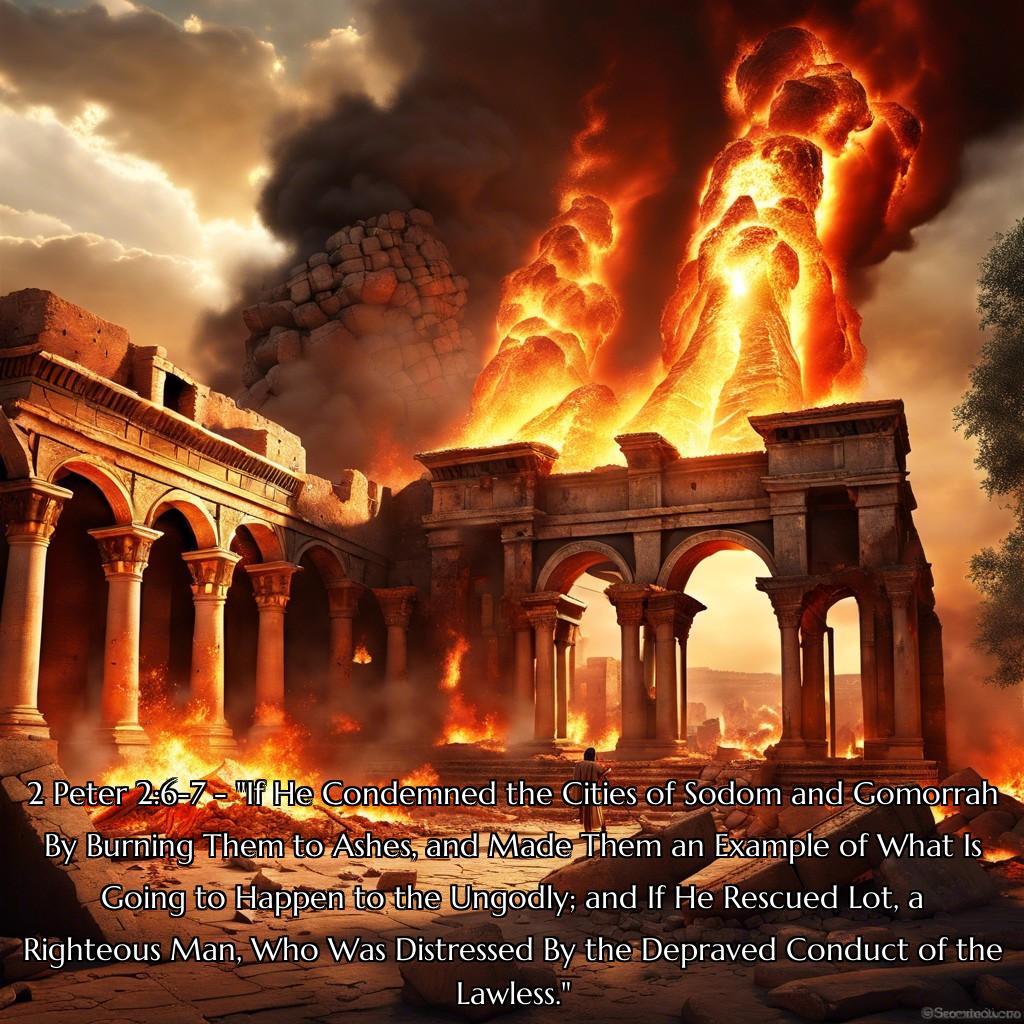
Peter reflects on the fate of Sodom and Gomorrah, emphasizing the divine judgment passed due to their immorality. These cities are often cited as examples of extreme corruption and ungodly behavior. By condemning them, God showcased His intolerance for such depravity.
Lot, as a righteous man, was deeply troubled by the rampant sinful acts around him. His distress paints a picture of virtue attempting to thrive amidst corruption. This passage highlights the stark contrast between godliness and lawlessness.
God’s intervention—destroying the wicked while sparing the righteous—demonstrates His commitment to justice. It underscores both the severity of divine punishment for sin and the protection extended to those who strive to live righteously.


